人教版七年级上册Unit 5 Do you have a soccer ball-Section B(2b – 3b)课件(共29张PPT)
文档属性
| 名称 | 人教版七年级上册Unit 5 Do you have a soccer ball-Section B(2b – 3b)课件(共29张PPT) | 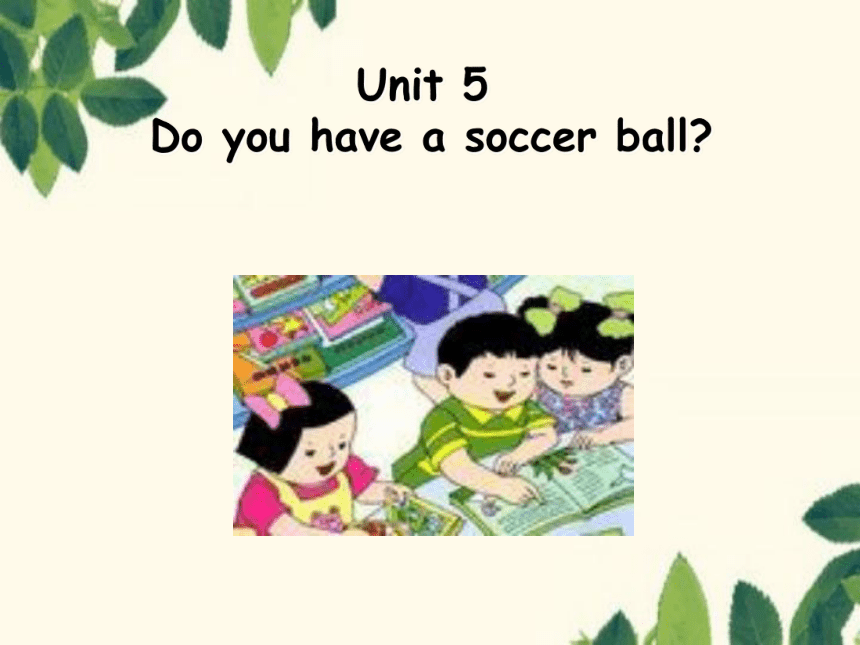 | |
| 格式 | ppt | ||
| 文件大小 | 361.0KB | ||
| 资源类型 | 教案 | ||
| 版本资源 | 人教新目标(Go for it)版 | ||
| 科目 | 英语 | ||
| 更新时间 | 2022-09-07 10:08:12 | ||
图片预览

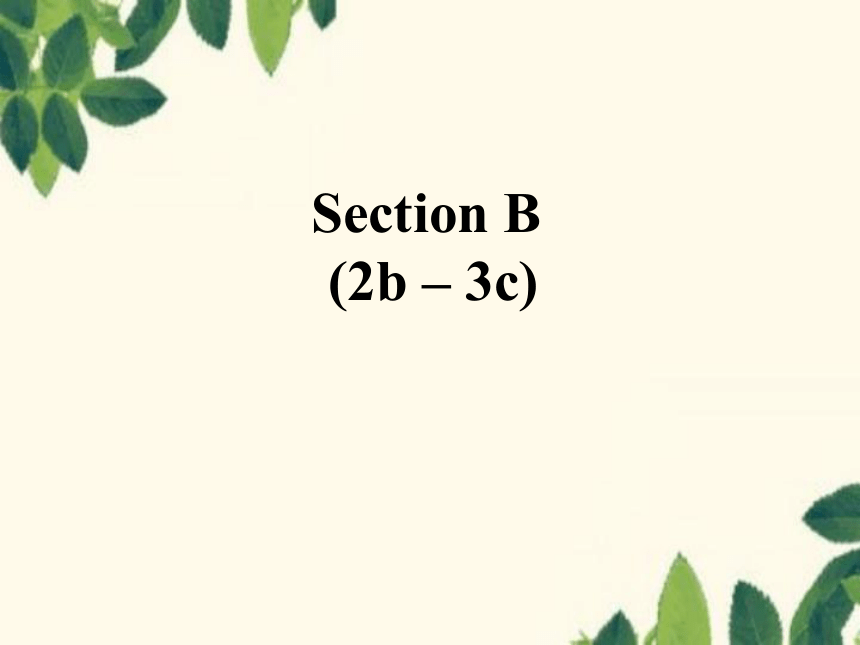
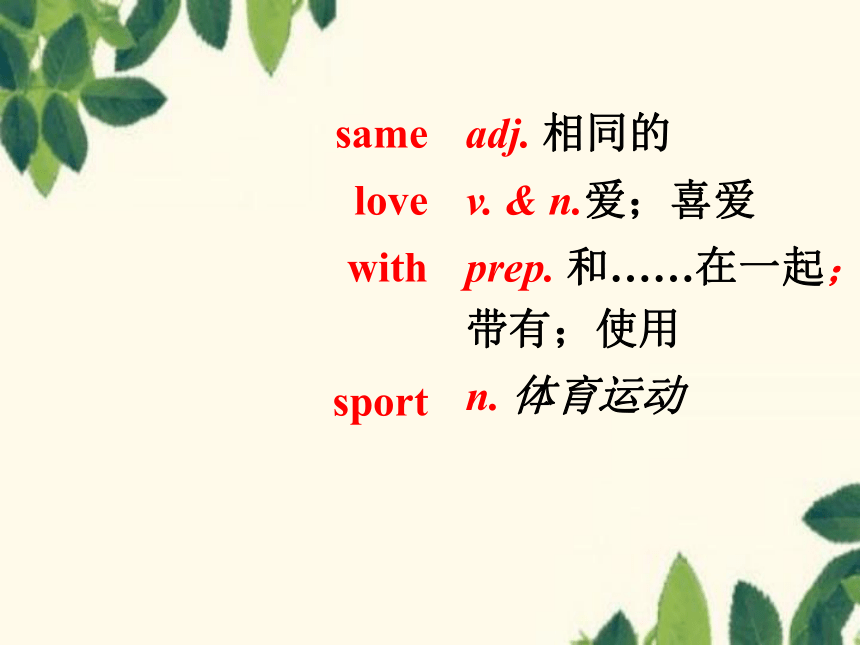
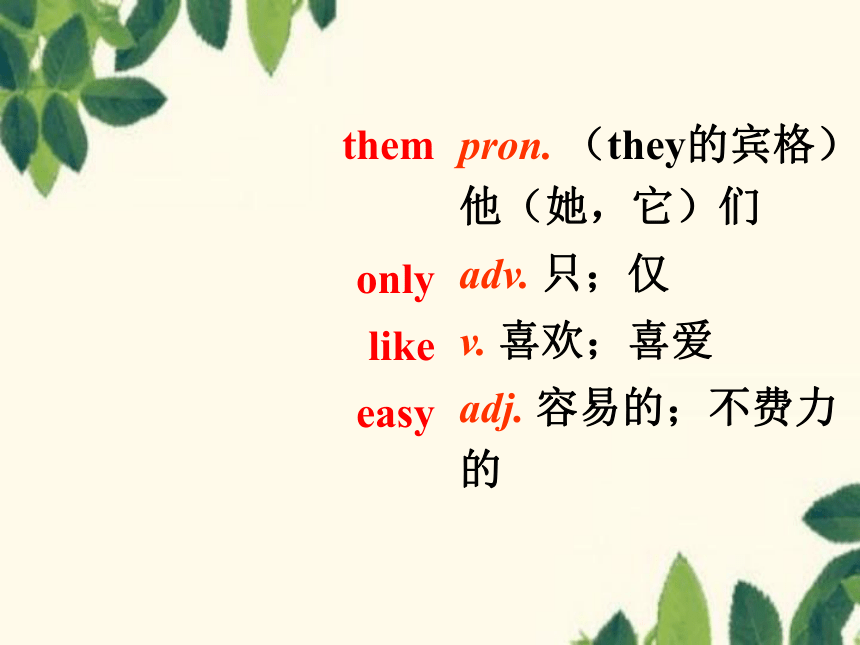
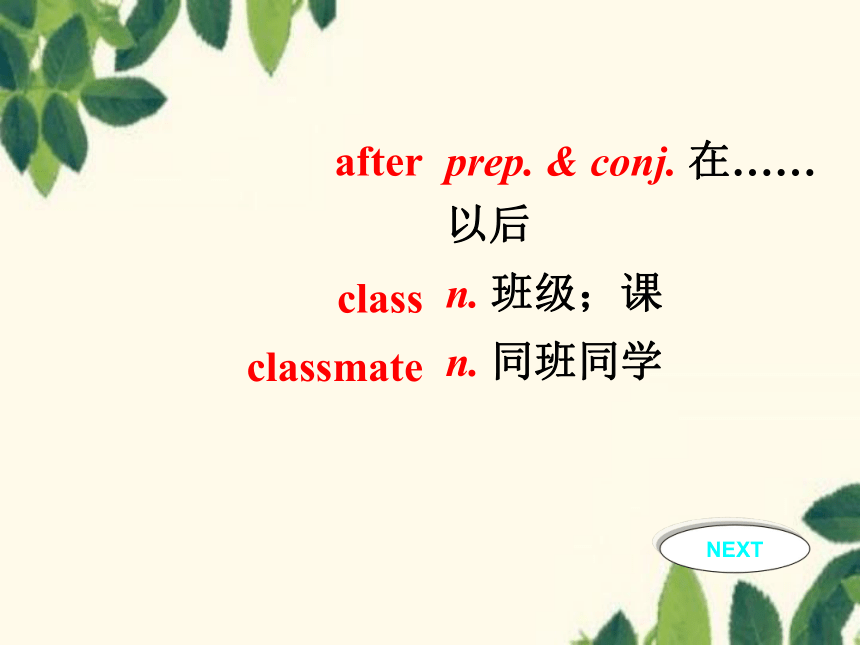
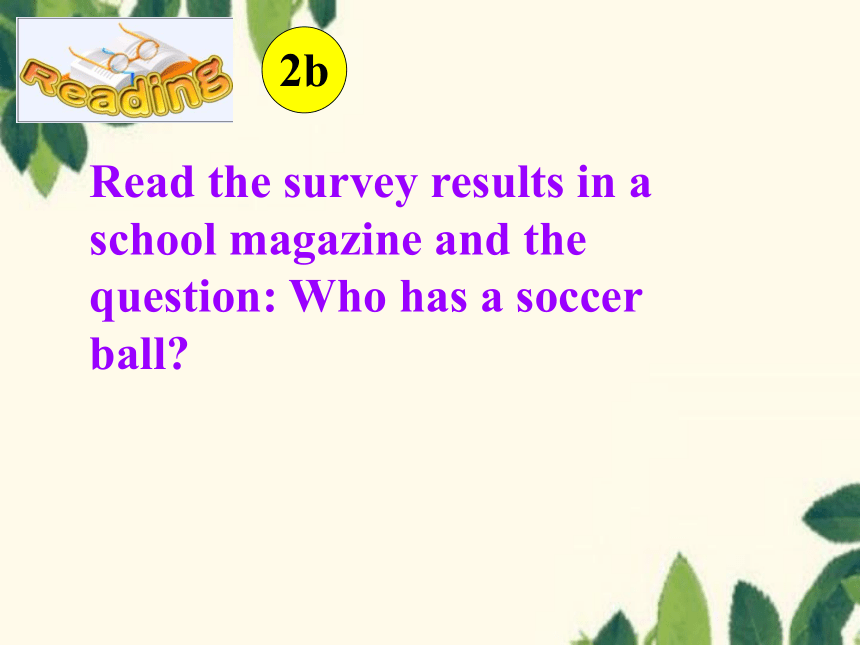
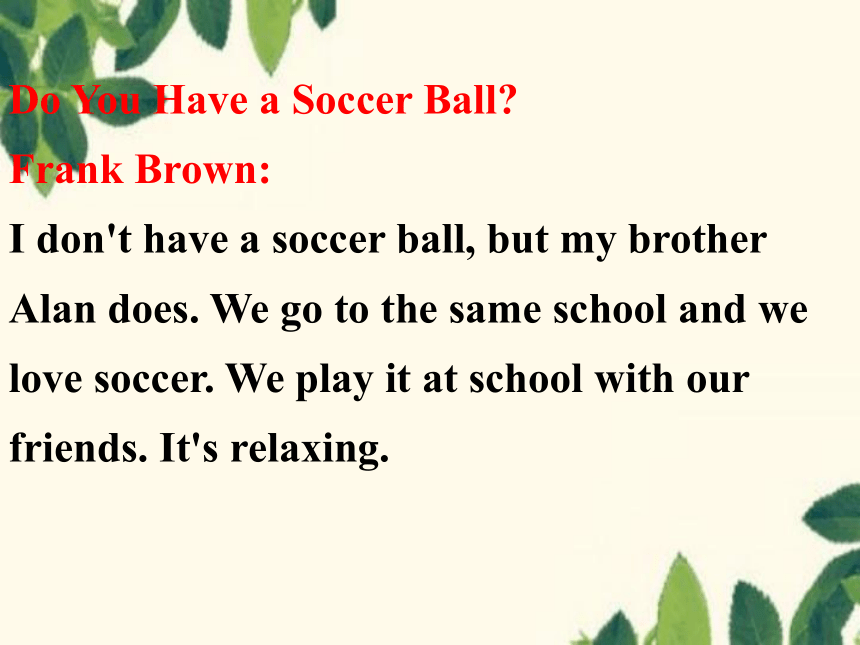
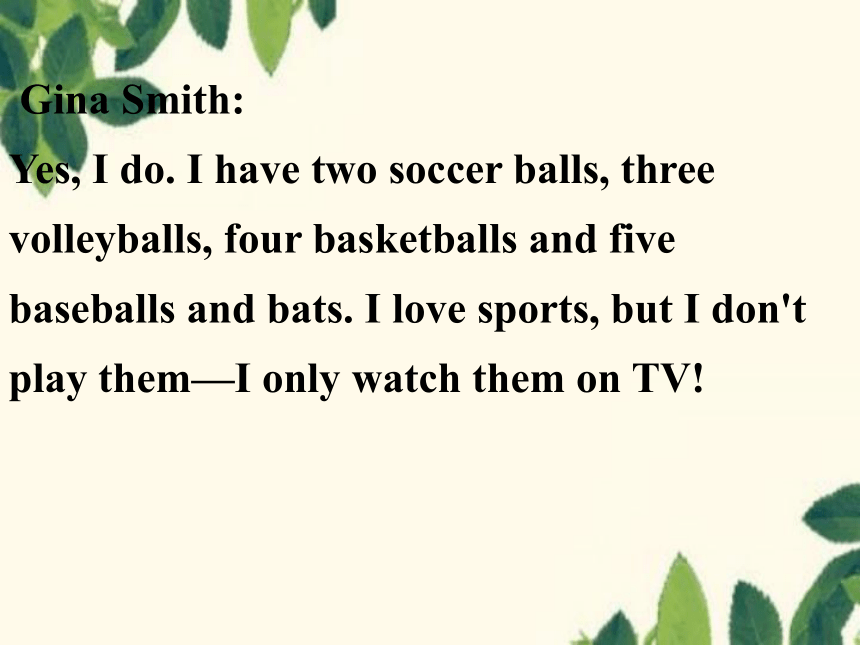
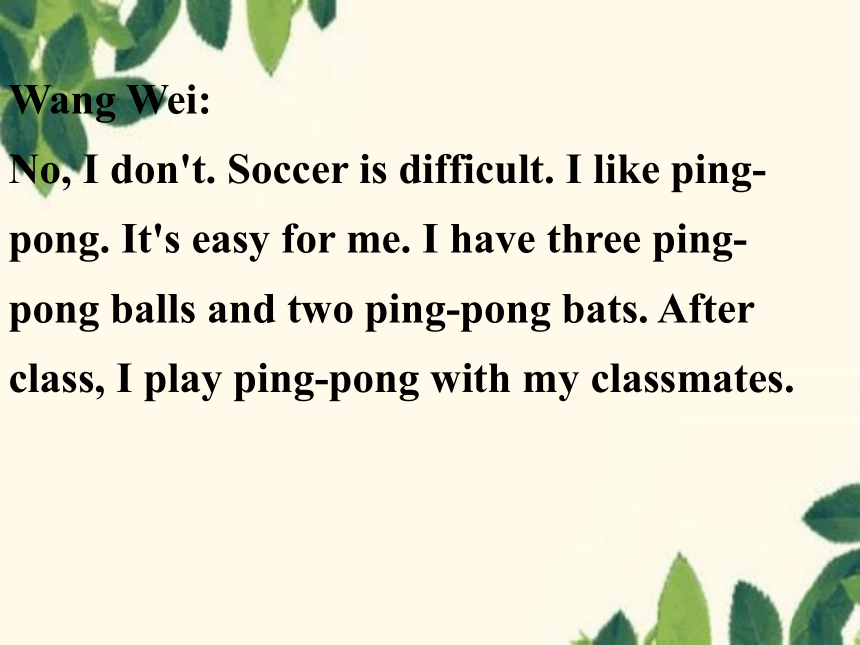
文档简介
(共29张PPT)
Unit 5
Do you have a soccer ball
Section B
(2b – 3c)
same
love
with
sport
adj. 相同的
v. & n.爱;喜爱
prep. 和……在一起;带有;使用
n. 体育运动
them
only
like
easy
pron. (they的宾格)他(她,它)们
adv. 只;仅
v. 喜欢;喜爱
adj. 容易的;不费力的
NEXT
after
class
classmate
prep. & conj. 在……以后
n. 班级;课
n. 同班同学
Read the survey results in a school magazine and the question: Who has a soccer ball
2b
Do You Have a Soccer Ball
Frank Brown:
I don't have a soccer ball, but my brother Alan does. We go to the same school and we love soccer. We play it at school with our friends. It's relaxing.
Gina Smith:
Yes, I do. I have two soccer balls, three volleyballs, four basketballs and five baseballs and bats. I love sports, but I don't play them—I only watch them on TV!
Wang Wei:
No, I don't. Soccer is difficult. I like ping-pong. It's easy for me. I have three ping-pong balls and two ping-pong bats. After class, I play ping-pong with my classmates.
Frank and Alan go to the same school.
2. Frank thinks playing soccer is boring.
3. Gina has many sports things.
4. Gina often plays sports.
5. Wang Wei has a soccer ball.
6. Wang Wei likes ping-pong.
Mark True (T) or false (F).
T
F
T
F
F
T
Read again and answer the questions.
1. How many students(多少学生)are in the survey?
2.What are their names
3.Who likes ping-pong
Three.
Frank Brown, Gina Smith, Wang Wei.
Wang Wei.
Who do you think says these sentences Check(√)F for Frank, G for Gina or W for Wang Wei. 你认为下面的话是谁说的?在相应的位置打勾(F代表弗兰克、G代表吉娜、W代表工伟)。
2c
1.I play ping-pong with my classmates
after class.
2. I have soccer balls, basketballs, volleyballs
and baseballs.
3. My brother has a soccet ball but I don’t.
4. I only watch sports on TV.
5. Soccer is not easy for me.
6. My brother and I are in the same school.
F
G
W
√
√
√
√
√
√
3a Write more questions about sports
equipment.
Sports Survey
Do you have a soccer ball
2.__________________________
3. __________________________
4.___________________________
( ) Yes, I do. ( ) No, I don’t.
( ) Yes, I do. ( ) No, I don’t.
( ) Yes, I do. ( ) No, I don’t.
( ) Yes, I do. ( ) No, I don’t.
3b Exchange books with a partner . Answer his or her questions in 3a .
3c Look at the information in 3a. Write
about yourself and your partner with
but.
____________________________________
____________________________________
____________________________________
____________________________________
I don’t have a baseball, but I have a soccer
ball. Tom has a baseball, but he doesn’t
have a baseball bat.
1. I don’t have a soccer ball, but my brother Alan does. 我没有足球,但我弟弟艾伦有。
本句中的does是一个代动词,用来代替上面那句话的内容。
— Who plays soccer with you 谁和你踢足球?
— Tom does. 汤姆。
do/does的这种用法只出现在上句是一个行为动词作谓语的情形中,如果是be动词或情态动词的话,则使用be动词或情态动词,
如:
Mary can play tennis well, but I can’t. 玛丽的网球打得好,但我打得不好。
Peter is a teacher, and I am, too. 皮特是老师,我也是。
BACK
2. We go to the same school...我们上同一所学校……
短语go to school表示“上学”,使用形容词same时,必须要加上定冠词the,构成the same...,
如:
We have the same dictionary. 我们的字典一样(我们有相同的字典)。
They are in the same school. 他们在同一所学校(上学)。
BACK
3.We play it at school with our friends.我们和朋友们一起在学校踢足球。
(1)句中的it是指代上文出现的soccer,构成play soccer(踢足球)。介词with后接某人,表示“和某人一起”之意,如:
Can I play basketball with you
我能和你一起打篮球吗?
(2)at school表示“在学校(上学)”,可以用in school来替换,如:
John is in school this year. 约翰今年上学了。
BACK
4. I love sports, but I don’t play them — I only watch them on TV! 我喜爱体育运动,但我不做运动,我只是在电视上看。
(1)them是用来指代前面的名词sports,即play sports(进行体育锻炼); watch sports(看体育运动节目)。
(2) watch TV看电视
watch sports games on TV在电视上看体育节目
【辨析】watch, see和look
动词watch表示“专注地看”,see表示看见的结果(不论是否看到);look表示“看”时,强调看的动作,不管看的结果,可单独使用,如果要后接宾语(即看的内容),则要使用look at。
BACK
5. It’s easy for me. (乒乓球)对我来说很容易。
句中的it指代的是上面出现的pingpong;后面的for me表示“对某人而言”,如:
Math is difficult for me. 数学对我来说很难。
BACK
Unit 5
Do you have a soccer ball
Section B
(2b – 3c)
same
love
with
sport
adj. 相同的
v. & n.爱;喜爱
prep. 和……在一起;带有;使用
n. 体育运动
them
only
like
easy
pron. (they的宾格)他(她,它)们
adv. 只;仅
v. 喜欢;喜爱
adj. 容易的;不费力的
NEXT
after
class
classmate
prep. & conj. 在……以后
n. 班级;课
n. 同班同学
Read the survey results in a school magazine and the question: Who has a soccer ball
2b
Do You Have a Soccer Ball
Frank Brown:
I don't have a soccer ball, but my brother Alan does. We go to the same school and we love soccer. We play it at school with our friends. It's relaxing.
Gina Smith:
Yes, I do. I have two soccer balls, three volleyballs, four basketballs and five baseballs and bats. I love sports, but I don't play them—I only watch them on TV!
Wang Wei:
No, I don't. Soccer is difficult. I like ping-pong. It's easy for me. I have three ping-pong balls and two ping-pong bats. After class, I play ping-pong with my classmates.
Frank and Alan go to the same school.
2. Frank thinks playing soccer is boring.
3. Gina has many sports things.
4. Gina often plays sports.
5. Wang Wei has a soccer ball.
6. Wang Wei likes ping-pong.
Mark True (T) or false (F).
T
F
T
F
F
T
Read again and answer the questions.
1. How many students(多少学生)are in the survey?
2.What are their names
3.Who likes ping-pong
Three.
Frank Brown, Gina Smith, Wang Wei.
Wang Wei.
Who do you think says these sentences Check(√)F for Frank, G for Gina or W for Wang Wei. 你认为下面的话是谁说的?在相应的位置打勾(F代表弗兰克、G代表吉娜、W代表工伟)。
2c
1.I play ping-pong with my classmates
after class.
2. I have soccer balls, basketballs, volleyballs
and baseballs.
3. My brother has a soccet ball but I don’t.
4. I only watch sports on TV.
5. Soccer is not easy for me.
6. My brother and I are in the same school.
F
G
W
√
√
√
√
√
√
3a Write more questions about sports
equipment.
Sports Survey
Do you have a soccer ball
2.__________________________
3. __________________________
4.___________________________
( ) Yes, I do. ( ) No, I don’t.
( ) Yes, I do. ( ) No, I don’t.
( ) Yes, I do. ( ) No, I don’t.
( ) Yes, I do. ( ) No, I don’t.
3b Exchange books with a partner . Answer his or her questions in 3a .
3c Look at the information in 3a. Write
about yourself and your partner with
but.
____________________________________
____________________________________
____________________________________
____________________________________
I don’t have a baseball, but I have a soccer
ball. Tom has a baseball, but he doesn’t
have a baseball bat.
1. I don’t have a soccer ball, but my brother Alan does. 我没有足球,但我弟弟艾伦有。
本句中的does是一个代动词,用来代替上面那句话的内容。
— Who plays soccer with you 谁和你踢足球?
— Tom does. 汤姆。
do/does的这种用法只出现在上句是一个行为动词作谓语的情形中,如果是be动词或情态动词的话,则使用be动词或情态动词,
如:
Mary can play tennis well, but I can’t. 玛丽的网球打得好,但我打得不好。
Peter is a teacher, and I am, too. 皮特是老师,我也是。
BACK
2. We go to the same school...我们上同一所学校……
短语go to school表示“上学”,使用形容词same时,必须要加上定冠词the,构成the same...,
如:
We have the same dictionary. 我们的字典一样(我们有相同的字典)。
They are in the same school. 他们在同一所学校(上学)。
BACK
3.We play it at school with our friends.我们和朋友们一起在学校踢足球。
(1)句中的it是指代上文出现的soccer,构成play soccer(踢足球)。介词with后接某人,表示“和某人一起”之意,如:
Can I play basketball with you
我能和你一起打篮球吗?
(2)at school表示“在学校(上学)”,可以用in school来替换,如:
John is in school this year. 约翰今年上学了。
BACK
4. I love sports, but I don’t play them — I only watch them on TV! 我喜爱体育运动,但我不做运动,我只是在电视上看。
(1)them是用来指代前面的名词sports,即play sports(进行体育锻炼); watch sports(看体育运动节目)。
(2) watch TV看电视
watch sports games on TV在电视上看体育节目
【辨析】watch, see和look
动词watch表示“专注地看”,see表示看见的结果(不论是否看到);look表示“看”时,强调看的动作,不管看的结果,可单独使用,如果要后接宾语(即看的内容),则要使用look at。
BACK
5. It’s easy for me. (乒乓球)对我来说很容易。
句中的it指代的是上面出现的pingpong;后面的for me表示“对某人而言”,如:
Math is difficult for me. 数学对我来说很难。
BACK
同课章节目录
- starters 预备篇(2012秋审查)
- Unit 1 Good morning !
- Unit 2 What’s this in English?
- Unit 3 What color is it ?
- Unit 1 My name's Gina.
- Section A
- Section B
- Unit 2 This is my sister.
- Section A
- Section B
- Unit 3 Is this your pencil?
- Section A
- Section B
- Unit 4 Where's my schoolbag?
- Section A
- Section B
- Unit 5 Do you have a soccer ball?
- Section A
- Section B
- Unit 6 Do you like bananas?
- Section A
- Section B
- Unit 7 How much are these socks?
- Section A
- Section B
- Unit 8 When is your birthday?
- Section A
- Section B
- Unit 9 My favorite subject is science.
- Section A
- Section B
